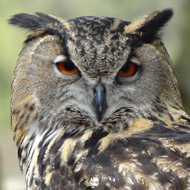
Researchers call for better regulation of bird markets
There has been a significant increase in the sale of owls in Indonesia since the launch of Harry Potter, according to new research.
Wildlife researchers surveyed 20 bird markets on the islands of Bali and Japan and found that the number of owls being sold soared from around a few hundred a year before 2001 to 13,000 by 2016.
Furthermore, they highlighted that where owls used to be called Burung hantu, which translates as ghost birds, now they are referred to as Burung Harry Potter (Harry Potter Birds).
But while Harry Potter may have had some effect on the normalisation of keeping owls as pets, in Indonesia at least, the authors say that blaming the increase of owls on the books alone paints too simplistic a picture.
“What we have seen in Indonesia is a massive increase in popularity of owls in general and pet owl lovers organise themselves on social media to exchange information on how to keep owls, what owls are available as pets, and where to obtain them”, explained Vincent Nijman, a professor of Anthropology at Oxford Brookes University.
“Only a year prior to the publication of Harry Potter the first public Internet café opened in Indonesia and the increase in the use of social media coincided with the rise of Harry Potter as a phenomenon.”
It has been 20 years since Harry Potter and the Philosopher’s stone was first published. In the years following its release, there have been suggestions that countries like the UK and India have seen a rise in owl keeping.
JK Rowling has spoken out against keeping owls as pets, stating: “If anybody has been influenced by my books to think an owl would be happiest shut in a small cage and kept in a house, I would like to say as forcefully as I can, you are wrong.”
In Indonesia, a wide range of bird species are available to buy in most major cities. By comparing data from market surveys from 1979 to 2016, thus including the years before and after Harry Potter was published, researchers were able to show that there had been an increase in the sale of owls.
"It is particularly heart breaking to see nocturnal animals like owls in the markets. Looking stunned and stressed under the bright sun, they are often only fed water and rice, making the situation all the more pitiful,” added professor Anna Nekaris.
“About half of the 2,000 or so owls we encountered in the markets were downy chicks, taken from their nests, and we expect the majority of them to die within weeks; this does not appear to be a sustainable trade.”
There are eight species of owl listed as globally threatened in Indonesia. The study authors are now calling for better regulation to ensure the unsustainable trade does not interfere with the birds' conservation.
The study, The Harry Potter effect: The rise in trade of owls as pets in Java, Bali and Indonesia, is published in the journal Global Ecology and Conservation.



 The latest
The latest